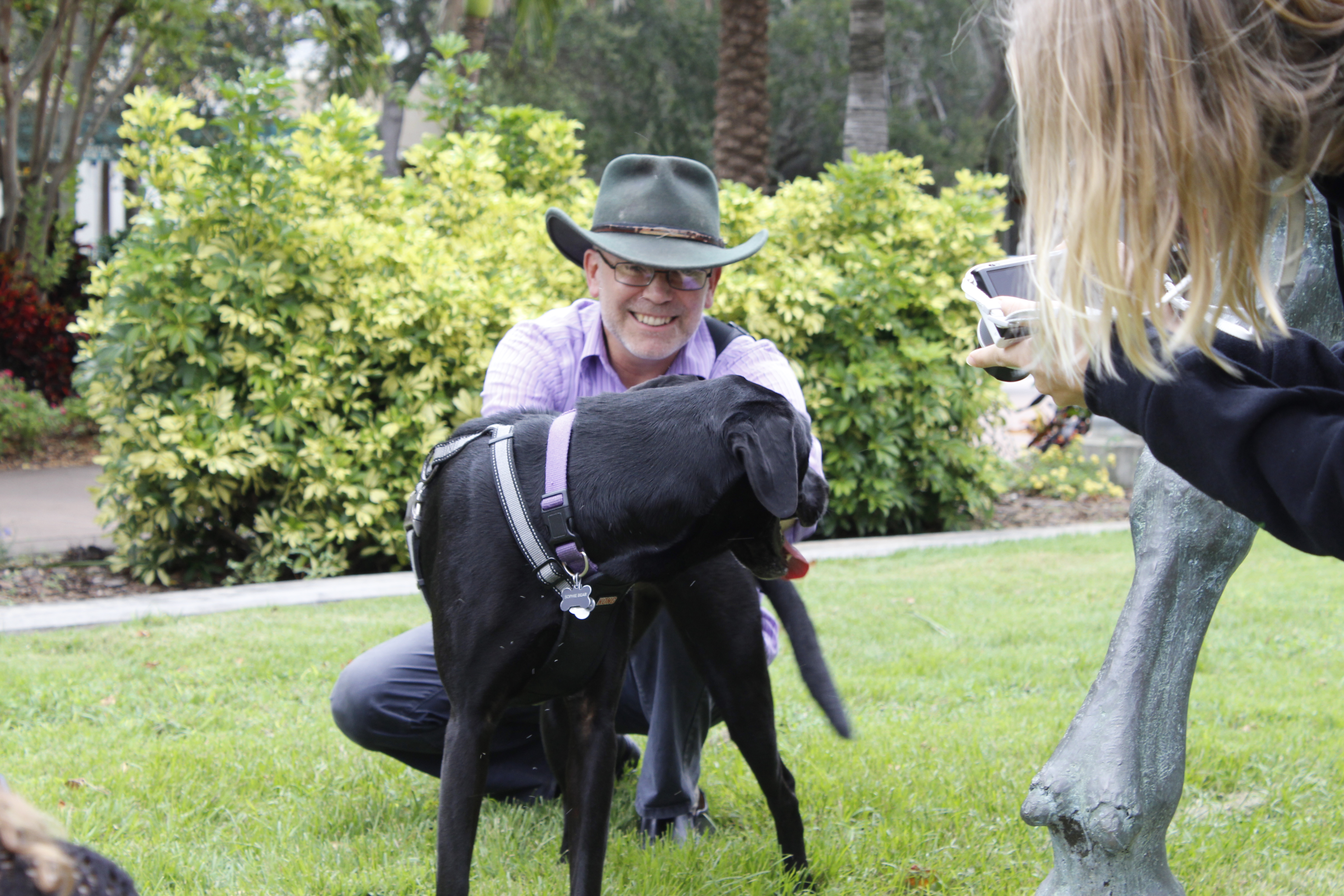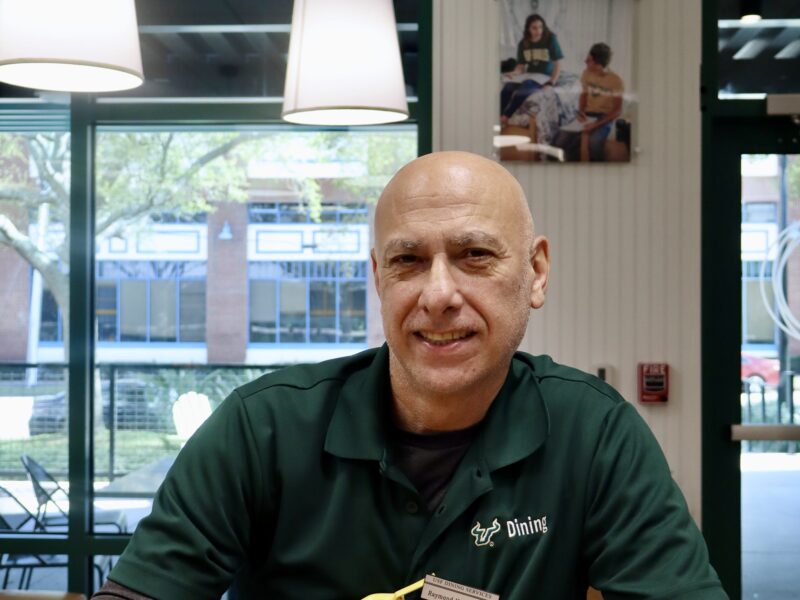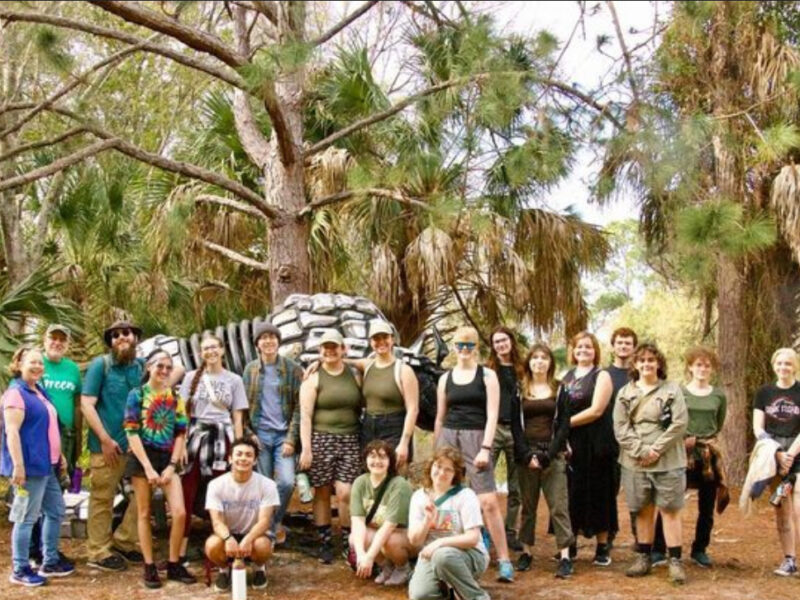By Dinorah Prevost
You’ve seen him around campus: dark green cowboy hat, a mug or paper coffee cup in hand, sitting at the bar at The Campus Grind.
He’s usually chatting with students and baristas or shooting photos at major events — his face masked by a Nikon camera.
Curious passersby often confuse him for the Australian bushman stereotype.
“It’s funny. People think I’m Australian. I’ve had people literally yell out ‘Hey mate’ anywhere and I’m like ‘I’m not Australian,’” Chris Campbell said.
A former USF St. Petersburg graduate student, Campbell “stuck around,” quickly becoming a staple on campus since 2012. That’s when VideoWorks, the in-house production studio for the Department of Journalism and Digital Communication, opened and he became its multimedia specialist.
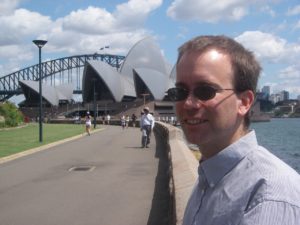
Campbell, 45, is modest about his life before arriving at the university in 2010.
To say he was an adventurer is an understatement. He’s been to Asia, Australia and Europe, and his love for travel came at just 3-weeks-old, after his parents carted him and his sisters from Philadelphia across the country.
He lived in Virginia, Southern California, Massachusetts and by middle school, he was tramping around Singapore. At the time, his stepfather worked for the now-defunct Lockheed Corporation, a global aerospace company, and was transferred to Singapore for three years.
“While we were in Singapore, we got to travel around Southeast Asia. Every vacation, we’d go to a different country to spend a holiday, like Japan, Australia, New Zealand, India, Nepal, Indonesia. We’d go to Malaysia a lot because it’s right there,” Campbell said.
His family eventually moved back to Los Angeles, where he went to high school.
Campbell didn’t navigate social circles well in school as a child. Instead, he fell in love with nature where he felt most comfortable.
“Growing up, I was very shy as a kid. I was really interested in bird-watching and animal and bird behavior so I’d just spend my time (doing that) in elementary school, middle school and high school, instead of going to parties or doing ‘normal’ things. I’d literally spend all my time in nature, on bird walks or hiking,” he said.
After high school, he went to the University of California, Santa Barbara.
“I assumed I was going to be a scientist so when I went to UCSB for my undergrad degree, I said ‘Well I like science, birds, animals so I’m going to do some kind of science,’” Campbell said.
He changed majors five times, switching from biology to environmental studies to anthropology to sociology. He eventually settled on environmental studies because he liked “the social aspect of it” as well as the science.
He spent his college vacations in England, where his parents moved for five years. The three of them would take road trips around England and Scotland so he knows both countries well.
He graduated from UCSB with his bachelor’s degree in 2004.
“If California wasn’t so expensive, I’d probably still be there. Santa Barbara is beautiful. It’s one of the prettiest places I’ve ever lived in. It’s got beaches and mountains and beautiful chaparrals,” he said. “But I couldn’t stay there. I had to leave. It was too expensive and I needed a job.”
One summer, he had the “crazy notion of working in a crab cannery” in Alaska.
He hitchhiked across the state, getting rides from truck drivers and sleeping in tent. He stayed in towns like Homer and Seward for a few weeks at a time.
“It was a strange experience,” Campbell said.
In 2002, he went on a monthslong road trip from Tampa to Virginia on a mission to find himself, Jack Kerouac style.
Traveling alone in a hatchback with a broken air conditioner and windows that didn’t roll down, he stopped for a few days in each city. He visited St. Augustine, Savannah, Georgia, Asheville, North Carolina and returned to California before reaching Virginia.
“It was a fun experience. I met a lot of interesting people,” he said.
As he traveled, Campbell told people he was an author writing a book so that they would tell him their stories.
“What happens is when you travel a lot, you accumulate all these experiences and the way they add up makes it very interesting because it’s very surreal,” he said.
But after a while, Campbell got tired of sleeping in a small car and being lonely. He ended the eight month trip.
While traveling he came to an important realization. “I really needed to have some kind of direction (in my life),” he said.
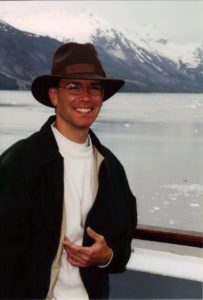
When he returned home, he finally stopped putting off graduate school, something he’d wanted to do for a long time.
“That’s life. A lot of times, you don’t know what you’re going to do and you just keep doing things and eventually you find something,” he said.
Before working in multimedia, Campbell had two other careers as a biologist and an environmental educator. He’s also been a school photographer and a substitute teacher. He’s always worked at least two jobs at the same time, but the most challenging was being a substitute teacher. He felt he didn’t have the temperament to deal with unruly students.
“It was the most challenging job I’ve ever experienced in my entire life.”
“As a substitute, they treat you really bad to begin with. It’s not that they were just rude or inconsiderate, it was like I was truly ignored. (In high schools) lots of times, they were like ‘I don’t care about you’…straight to my face. They’d get up and leave and they’d cuss me out. It was insane,” he said.
He also watched students fight in class, right in front of him.
“I really think that if no one stopped them … I think they would have killed each other.”
One principal at Lakewood high school told him he wasn’t cut out to be a teacher and encouraged him not to return.
“She was absolutely right,” Campbell said. “(But) it was important (for me to work as a substitute) because it made me realize that I cannot teach anything below college. I did learn how difficult (public school) teachers have it.
As a biologist, he did student biology and field jobs and also worked at the Florida Fish and Wildlife Conservation Commission. At the same time, he was an environmental educator at places like the Museum of Science and Industry (MOSI), the old Pier Aquarium and Busch Gardens.
“I worked in Texas one time tracking snakes and little birds, walking around with a transmitter like they do in National Geographic (shows).”
After working in biology and environmental education for a while, he decided that he wanted to do them as a hobby. He was also limited in his science career opportunities because he didn’t have a master’s degree or a doctorate in his field.
“I just realized that I didn’t want to be a scientist professionally. I wanted to pursue it as a hobby. But I wanted to do film, photography and videography as a job.”
Campbell previously did school photography in Santa Barbara for a year. His father was also a photographer during the Vietnam War.
Fulfilling the decision he made in 2002, he finally went to back to school in 2010. He enrolled in the master’s program in the then Department of Journalism and Media Studies at USF St. Petersburg. His focus was on documentary filmmaking.
When he came to campus to inquire about the program, Mark Walters, the founding director of the online only Digital Journalism and Design program, asked Campbell for help using Final Cut Pro, a video editing software.
“I ended up helping him with Final Cut for an hour and then he said ‘I think you should come to the program and be my GA (graduate assistant).’”
He was in his second year of graduate school in 2011 when Walters asked him to start a studio to produce content for the program. When he took the offer, Campbell was overwhelmed with it for about three weeks because he had no experience.
“I was really freaking out because I thought ‘Wait, you want me to build a studio from a classroom with every piece of equipment’.”
To help, Walters brought in a consultant, Casey Frechette, who was an interactive learning producer at the Poynter Institute. That’s when Campbell and Frechette, now an assistant professor in the journalism department, first met.
“I was helping them design the studio and pick out some equipment,” Frechette said.
Walters also got another graduate student, Edgardo Dangond, to work on the information technology end and build the production computer from scratch. Dangond is now the studio’s technical director.
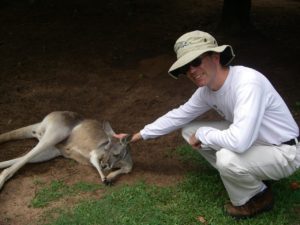
Together, they transformed a small classroom on the first floor of the Peter Rudy Wallace Florida Center for Teachers into a fully functioning studio. VideoWorks opened in 2012.
When Campbell graduated from the program in 2013, he was back in the studio the next week.
“I remember I graduated on Saturday and on Monday, it was just back to work doing the exact same thing because the studio had to be run. The only difference was (I) had a master’s degree now,” he said.
Campbell is also an adjunct professor, teaching photojournalism and video storytelling classes with Frechette. They took the classes from former professor Debbie Wolfe in 2014.
“We try to have fun with our work, whether it’s teaching or the production work that we do in the studio. More often than not, it’s intrinsically interesting if nothing else,” Frechette said. “We’re kind of kindred spirits in the way that we approach our work and look at things.”
Pictured Above: Campbell petting a student’s dog during a photojournalism class. Courtesy of Chris Campbell

